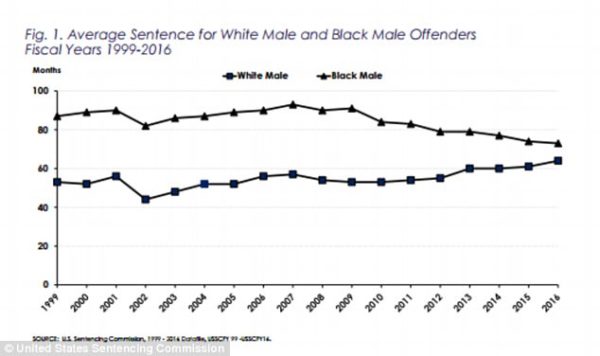New Study: Blacks Given Harsher Prison Terms Than Whites Convicted of the Same Crime
Ariel Zilber, Daily Mail, November 17, 2017
Black men are given harsher prison sentences compared to white men who have committed the same crime, according to new government data released on Friday.
According to the US Sentencing Commission, African-American males serve on average 19.1 percent longer prison terms than white men convicted of the same crime.
The data shows that the disparity can’t be explained by prior convictions or a history of violence.
‘Violence in an offender’s criminal history does not appear to contribute to the sentence imposed,’ the agency said in the report.
The charts used in the study divide the periods between Koon (1998 to 2003); PROTECT (2003-2004); Booker (2005-2007); Gall (2007-2011); and Post-Report (2011-2016).
Koon is a reference to the Supreme Court decision of Koon v. United States, which allowed US federal courts to hand down more lenient sentences than those prescribed by US Sentencing Commission guidelines based on circumstantial factors of an individual case.
That case was an appeal of the 30-month federal sentence handed down to Stacey Koon, one of the four Los Angeles Police Department officers involved in the beating of Rodney King in 1991.
PROTECT refers to The PROTECT Act of 2003, which mandated tougher prison sentences for sex offenders who target children, particularly if they had a prior record.
The Booker period is the one that comes after the United States v. Booker Supreme Court decision.
The Court ruling gave federal judges significantly more discretion on sentencing.
It allowed judges on the bench to determine sentences beyond those called for in US Sentencing Commission guidelines.
Gall refers to the period from 2007 until 2011; and Post-Report refers to the period from 2011 until 2016.
According to the US Sentencing Commission, African-American males serve on average 19.1 percent longer prison terms than white men convicted of the same crime. The charts divide the periods between Koon (1998 to 2003); PROTECT (2003-2004); Booker (2005-2007); Gall (2007-2011); and Post-Report (2011-2016)
When the sentencing judge took an offender’s violent past into account, black men still received sentences that were on average 20.4 percent longer than that of white men.
The report found that the disparity in sentences handed down to blacks and whites has been exacerbated by the 2005 Supreme Court decision in United States v. Booker.
Instead of being limited by recommendations of the guidelines, judges were free to impose harsher sentences when taking factors of the case into account.
The findings also suggest that judges were more likely to pass down more lenient sentences to whites.
When judges did grant more lenient sentences to blacks, those prison terms were still harsher than lenient sentences handed down to whites.
The study also found that females were given lighter sentences compared to white men
The USSC is a bipartisan agency that operates under the authority of the Justice Department.
The report is an analysis of demographic prison data collected from 2012 until 2016.
The study also found that the imprisonment rate of black women is twice that of white females.
Overall, African-Americans are incarcerated at a rate of more than five times that of white Americans.
The African-American population in the US numbers about 39 million, while whites account for 198 million, according to the 2010 Census.
The chart above measures the disparity in sentences handed down to males. It found that male blacks were more likely to receive longer sentences than white men
Another significant finding in the study is that females of all races received on average lighter sentences for the same crime than white males
The data shows that the disparity can’t be explained by prior convictions or a history of violence
If blacks and Hispanics were incarcerated at the same rates as whites, the prison population in the United States would fall by almost 40 percent, the report found.
Despite being just five percent of the world’s population, the US has the world’s largest prison population — 2,145,000 inmates.
The number represents a 500 percent increase over the last 40 years, according to The Sentencing Project.
China, the world’s most populous nation with nearly 1.38 billion people, has the second largest inmate population at 1,649,804, according to the World Prison Brief.
Critics of the US prison system say that the stiff sentencing and racial disparities are contributing to the disproportionately large inmate population.
[Editor’s Note: The original article includes charts mentioned in the text comparing the Koon, PROTECT, Booker, Gall, and post-Report periods.]
















